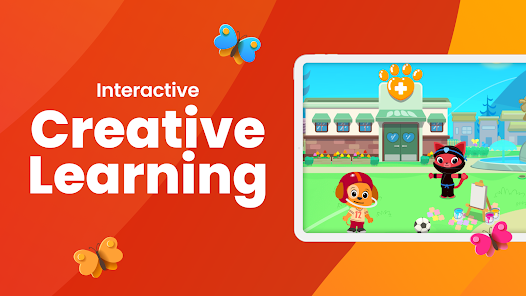Technology shapes how we work, connect, and learn today. Children are accustomed to cellphones, iPads, and digital devices. Educational apps for kids are helping many parents use this exposure for good. These apps turn electronics into amazing learning tools that let kids study in a fun way. These platforms offer more than entertainment, from interactive stories to kindergarten and advanced kids learning activities. Why are they smart investments? Come explore.

Kids Learning Games Apps Are Fun
Keeping kids motivated is difficult in early education. Traditional teaching methods emphasize memorizing, which might bore young students. A kids education app overcomes this by making instruction interactive. Math education might be puzzles or racing games where kids answer amounts to advance. Story characters speaking, singing, and interacting may make reading an adventure. These applications make learning fun and foster curiosity and excitement by blending play and learning.
Learn anytime, anywhere
Accessibility is another benefit of investing in educational applications for kids. Apps are always available, unlike books and classroom activities. Children can study while commuting, waiting at the doctor, or at home. Tablets and smartphones are portable classrooms. Because one app generally covers numerous subjects and activities, this versatility saves time and money. Instead than buying books and activities for each topic, parents may find everything online.
Personalised Learning for All Kids
Different kids learn differently, and traditional schools often struggle to accommodate them. Kids education apps frequently change difficulty to a child’s progress. Kindergarten learning games activities may start with letter recognition and progress to spelling and word-building. Math games may progress from counting to problem-solving as kids gain confidence. This customisation prevents youngsters from feeling stressed or behind. Advanced learners are engaged because the software challenges them at their pace.
Self-Learning Habits
Educational games foster independence over time. Children can explore activities without parental or teacher guidance. They choose, solve difficulties, and take charge of their progress. This independence boosts self-confidence and decision-making outside school. Independent learning gives kids confidence and curiosity when they face new problems.
Playing with Learning
Games are naturally fun for kids, but parents worry about too much screen time. Kid-friendly educational applications combine fun and learning. Spelling lessons might be matching games, while science experiments can be interactive stories. Kindergarten learning games introduce numbers, shapes, and language via plays with colors, music, and storytelling. This keeps kids entertained and educated.
Economical and Sustainable
Kids education applications are cost-effective, another reason parents like them. One app can supply several resources instead of toys, books, or tutors. Many platforms include math, reading, science, and creative in one membership or purchase. Regular updates give kids free access to fresh content in the apps. This is much more valuable than traditional resources over time.
Making Screen Time Productive
Screen addiction is a major parenting issue. Screen time might be bad, but instructional games can help youngsters learn. Children use the same devices for interactive learning instead of passively watching cartoons or skimming through videos. Parents may rest certain that their child’s screen time is educational and enriching.
Child Education Preparation
Early childhood education prepares students for academic achievement. Kindergarten learning activities on letters, numbers, and shapes help kids adjust to school. While teaching problem-solving, logic, and reasoning, apps lay the groundwork for science and math. Children become familiar with technology, another hidden benefit. youngsters education applications let youngsters organically learn digital literacy, which is becoming as important as reading and writing.
Conclusion:
Buying educational apps for kids involves more than just buying technology. It’s about creating an environment where learning is fun and adjusts to each child’s speed. Kids education apps are convenient, affordable, and personalized, while kindergarten and kids learning games prepare youngsters for academic and personal success. These apps help kids develop academic abilities, creativity, confidence, and independence by combining entertainment and disciplined learning.
Educational games are more than just useful tools in the digital age, where technology shapes our lives. They are a prudent investment in our children’s future.